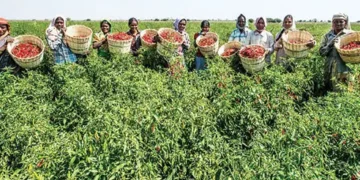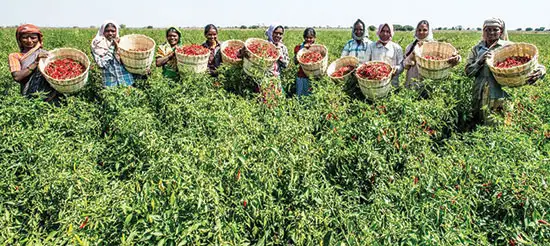Blitz Bureau
NEW DELHI: Agriculture in India has always drawn strength from traditional knowledge and sustainable practices. Yet, with the rapid growth of input-intensive farming, concerns over soil degradation, water quality, and food safety have become more pressing. Recognising the need to restore ecological balance while improving farmers’ livelihoods, the Government launched the Paramparagat Krishi Vikas Yojana (PKVY) in 2015 under the National Mission for Sustainable Agriculture.
Over the last decade, PKVY has grown into a cornerstone of India’s organic farming movement. It has provided farmers with an organised platform to adopt ecofriendly practices, access organic certification, and link with markets that reward sustainable production. What began as a cluster-based initiative is now an ecosystem of training, certification, and market development, shaping India’s long-term vision for resilient agriculture.
Cluster approach
At the heart of PKVY lies the cluster approach. Farmers are mobilised into groups of 20 hectares each to collectively adopt organic farming methods. This model not only ensures uniform standards but also reduces costs by encouraging resource-sharing. Since its inception, thousands of such clusters have been formed across states, enabling farmers to reduce dependence on chemical inputs, improve soil fertility through organic amendments, and adopt diversified farming systems. Training and capacity-building sessions have been central to this process, equipping farmers with practical skills and confidence to make the transition.
The objective of the PKVY is to advance a scalable model of eco-agriculture that integrates low-cost, chemical-free techniques with farmer-led collectives, enhancing food safety, income generation, and environmental sustainability. Under the PKVY, farmers adopting organic farming practices are being assisted with Rs 31,500 per hectare for a three-year period. This holistic support ensures that farmers not only adopt organic practices but also receive help with certification, branding, and market linkages for better income generation.
Operational framework
The implementation of the scheme follows a structured, farmer-centric approach. All farmers and institutions are eligible to apply under the scheme, subject to a maximum landholding limit of two hectares.
The process involves farmers approaching their Regional Councils, which are responsible for guiding them through enrolment and certification. These Councils compile the individual applications into an Annual Action Plan, which is then submitted to the Ministry of Agriculture & Farmers Welfare for approval. Once the Annual Action Plan is sanctioned, funds are released by the Centre.
Through this structured framework, PKVY ensures that small and marginal farmers across the country can access organic farming support seamlessly, while maintaining accountability at every stage of implementation.
A major barrier for organic farmers in the past was the absence of credible certification. PKVY addressed this through two distinct systems: =Third-Party Certification: Implemented by Accredited Certification Agency under the National Programme for Organic Production, the system ensures compliance with international standards.
=Participatory Guarantee System for India: It is farmer-centric, community-based certification. Farmers and producers collectively participate in decision-making, peer inspections, and mutual verification of practices, ultimately declaring the produce as organic. In 2020–21, the Government launched the Large Area Certification programme to fast-track certification in regions where chemical farming has never been practiced (tribal belts, islands, eco-preserved zones).
Mainstream movement
Over the last decade, PKVY has transitioned organic farming from a niche practice to a mainstream agricultural movement, contributing to sustainable agriculture, rural digitisation, and inclusive market access aligned with Digital India and Atmanirbhar Bharat.
As on January 30 this year, a total amount of Rs 2,265.86 crore was released under the PKVY (2015–25). For FY2024-25, Rs 205.46 crore was released. Around 15 lakh hectares was brought under organic farming; 52,289 clusters formed; and 25.30 lakh farmers benefitted (as of February 2025). As India steps into the next phase of its agricultural transformation, PKVY stands as a testament to how traditional practices, when combined with modern systems and digital tools, can pave the way for a greener, healthier, and more prosperous future.


























